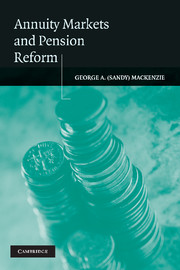Book contents
- Frontmatter
- Contents
- List of Tables
- Acknowledgments
- Introduction
- PART ONE
- PART TWO
- 5 Individual Liberty versus Security in Retirement, and the Government's Role
- 6 Policy Issues with Both Public and Private Sector Provision of Mandatory Annuities
- 7 Policy Issues with Privatization of the Provision of Annuities
- 8 Conclusions and Recommendations
- Appendix 1 The Economics and Financing of Annuities
- Appendix 2 Aging and Its Impact on Pension Systems
- Glosssary
- References
- Index
5 - Individual Liberty versus Security in Retirement, and the Government's Role
Published online by Cambridge University Press: 13 November 2009
- Frontmatter
- Contents
- List of Tables
- Acknowledgments
- Introduction
- PART ONE
- PART TWO
- 5 Individual Liberty versus Security in Retirement, and the Government's Role
- 6 Policy Issues with Both Public and Private Sector Provision of Mandatory Annuities
- 7 Policy Issues with Privatization of the Provision of Annuities
- 8 Conclusions and Recommendations
- Appendix 1 The Economics and Financing of Annuities
- Appendix 2 Aging and Its Impact on Pension Systems
- Glosssary
- References
- Index
Summary
INTRODUCTION
The designers of an individual accounts pension reform must make a huge number of technical decisions. But two basic issues of political economy and philosophy underlie all of them. The first is whether to place restrictions of any kind on withdrawals from the accounts. The second, assuming that restrictions are imposed and take the form of a requirement to purchase an annuity or some other financial product that provides for phased withdrawals, is who should supply the product: the public sector, or the private sector.
The regulation of distributions from individual accounts raises basic issues of political philosophy: the proper domain of state action, the bounds of individual choice, and the appropriateness of paternalistic government. Similar issues arise with the regulation of distributions from employer-provided pension plans and tax-favored individual retirement savings and personal pension plans. As the introduction noted, the defined contribution plan is superceding the defined benefit plan in a number of the larger industrial countries. Typically, withdrawals from these plans are lump sum. The growing importance of defined contributions plans is creating an important public policy issue: whether to impose restrictions on distributions to prevent an excessive rate of dissaving, or modify the tax system to the same end.
The question of whether annuities, if mandatory, should be publicly or privately provided raises similar philosophical issues.
- Type
- Chapter
- Information
- Annuity Markets and Pension Reform , pp. 133 - 143Publisher: Cambridge University PressPrint publication year: 2006

